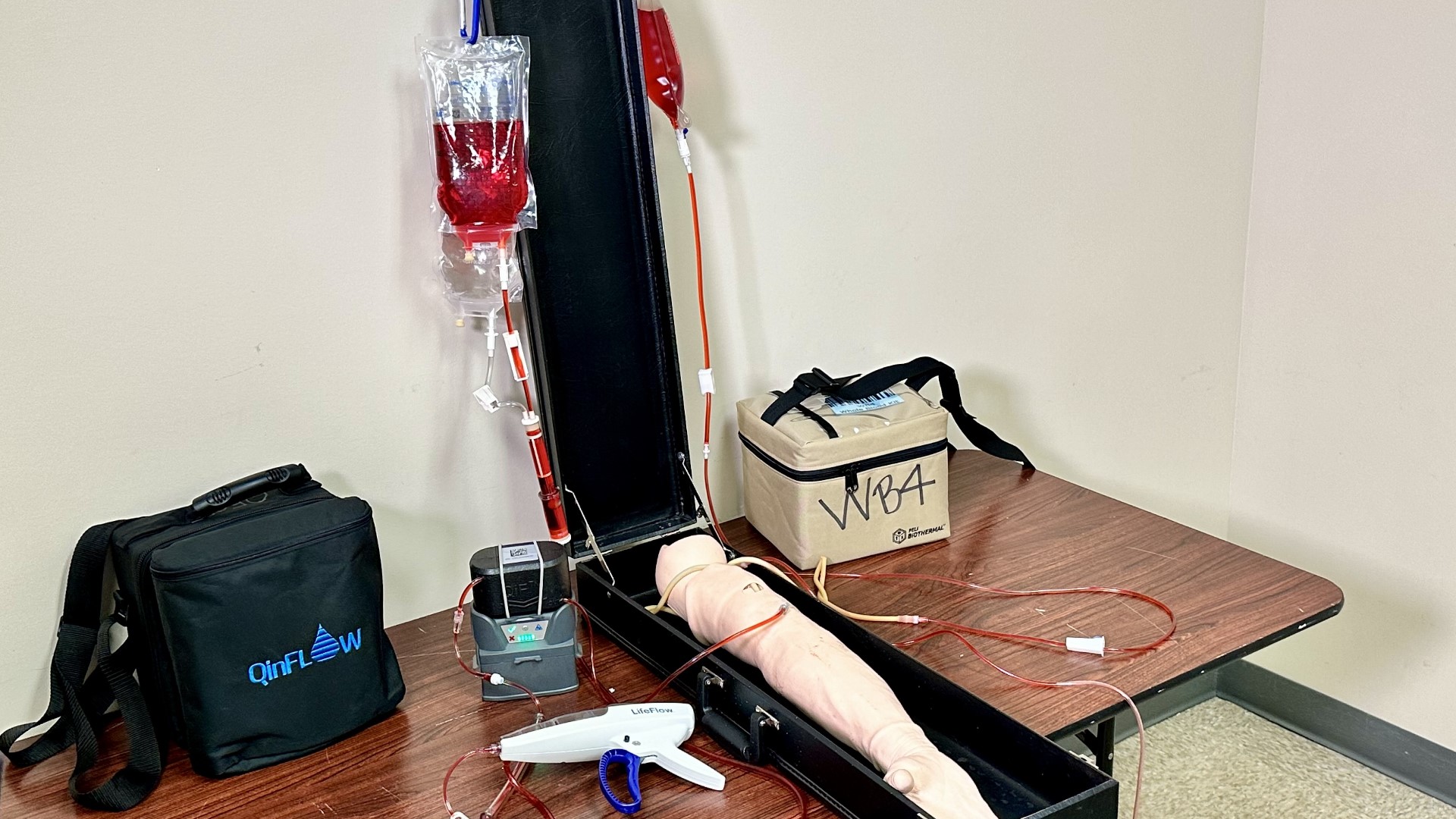ATLANTA — Grady EMS is now equipped with a new life-saving tool that will allow trauma patients who need it to receive whole blood transfusions while en route to the emergency room.
Grady Hospital is the only Level 1 trauma center in Atlanta.
Dr. Ryan Fransman, one of several trauma surgeons at the hospital, said, "Grady is one of, if not the busiest trauma centers in the nation."
He recently worked in Baltimore before moving to Atlanta and working in the ER at Grady.
"It is like battlefield medicine," Dr. Fransman explained.
He's referring to the type of trauma patients they see come into the ER. Dr. Fransman said they see a lot of patients who have been shot multiple times with high-powered rounds. Violent crime victims make up a lot of their patients, including stabbings.
Dr. Fransman said EMS brings in a number of patients involved in high-speed crashes.
"Also, one of the things that I see so much more here than I did in Baltimore is pedestrian accidents. The road safety here is scary to me," Dr. Fransman said.
He said all of these types of traumas cause the patients to lose a lot of blood, which is why seconds count when it comes to saving their lives.
This is why Dr. Lekshmi Kumar, who is the Medical Director of Grady EMS, said it was so important to bring this blood program to Grady.
It's the first of its kind in the City of Atlanta.
"What we're trying to do is bring that whole blood out onto the street so that the patient can get it sooner, as soon as the trauma occurs, to help improve the odds of survival," Dr. Kumar explained.
The blood will be stored in a cooler on Grady EMS Quick Response Vehicles (QVR). These are the SUVs and trucks that often times respond to calls alongside Grady ambulances.
The paramedics driving these QVRs monitor the calls being dispatched and will also be specifically dispatched — just like an ambulance — if it's known immediately that the trauma patient will need a blood transfusion.
The coolers on board store the blood at two to six degrees Celsius. Once the QVR arrives on the scene, the patient is accessed and the bleeding is stopped. The team will start the IV as the patient is being loaded into the ambulance.
The infusion set is then set up, which includes a warming device. This will allow the blood to be warm once the transfusion is underway. It happens quickly. They use a tool called "Life Flow," which speeds up the process, allowing paramedics to administer a unit of blood within two minutes.
Keep in mind that this is all happening as the patient is being loaded and transported to the ER.
The goal is first to stop the bleeding and then get whole blood into the patient before it's too late.
"People go into shock because of blood loss. And that's one of the leading causes of death, especially in trauma patients," Dr. Kumar explained.
She added, "Ideally you want to replace lost blood with blood because it has all the components of blood that the patient has lost, and it helps improve their clotting factors and then to recover and stabilize faster."
Dr. Fransman said this is a game changer for the city.
"I'm saying that you're taking patients that are in a period of time in their lives where they are about to die, or they have died, and we have now got this intricate moment, and we can intervene with blood, try and replace the volume that they've lost and regain some form of blood pressure and heart rate that is sustainable with life, to at least buy them a couple minutes to get to us and intervene on them," he explained.
In just the first 11 days, Dr. Fransman said paramedics have performed 14 blood transfusions.
"I mean, it's devastating for Atlantans as a whole that they're seeing these injuries. But at the at the same time, we are just excited that we can be intervening on these folks," Dr. Fransman said.
He said a majority of the patients who received the transfusions are doing really well today.
Dr. Kumar said it's important to point out they are not wasting any blood.
"Within two weeks, we circle back to the hospital, and they're able to use any blood we didn't in the operating room and in the trauma center," she explained.
It's also a great time to remind people that if they can, they should donate blood.
"There are, unfortunately, a lot of trauma calls that happen within the city. And when people need blood, they need it," Dr. Kurmar said.
She also wanted to make sure the team who helped make this blood program come to life was recognized for their hard work. Dr. Kumar said it's taken about a year to get everything in place. She said the credit goes to the training department, which managed to train everyone and get them up to speed.
"Everybody who supported trying to get all this equipment because it's not easy. And to the medics who are using it and the people who are doing the initial stabilization because if they didn't get everything rolling, I mean, we wouldn't be able to get this far," Dr. Kumar added.

